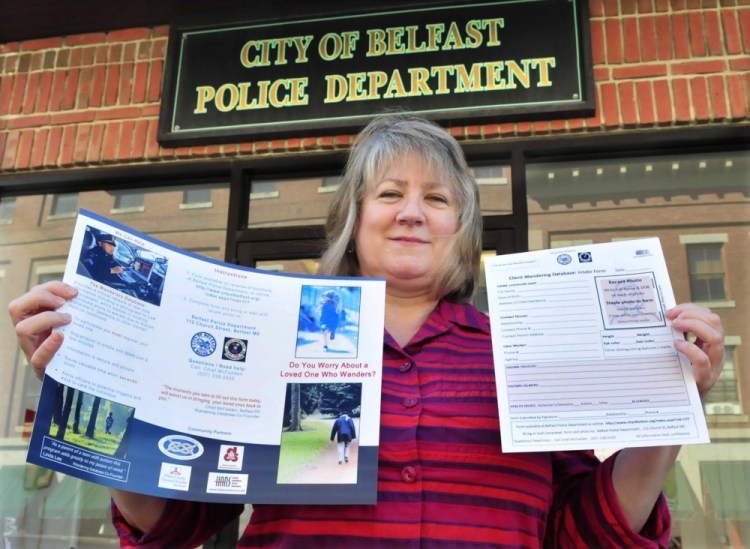Since her son Christian was diagnosed with autism at the age of 2, Linda Lee has had a hard time keeping him in one place.
He would run away with no clothes on, prompting Lee to put locks on the tops of the doors and on windows, but he would still figure out ways to climb out the windows or unlock the doors.
Lee was especially concerned since Christian also loved to run toward traffic and along the lines on the road.
“It was such a nightmare. I could never sleep because I was constantly afraid of him getting out,” said Lee, a former nurse and home health worker from Belfast. “It’s always a concern on any parent’s heart if their child get outs and runs away and they have no way to find their way home and that there is no way to communicate that they are lost.”
Christian, who also goes by the nickname “Tiger,” is 15 now; and though he is less inclined to run away, his mother still lives with the fear that it could be a challenge to find him if he did. He always has been anxious around police and would run if he saw them, she says.
Then, last year, Linda Lee read an article in The New York Times about a 14-year-old boy with autism named Avonte Oquendo, whose disappearance and subsequent death prompted lawmakers to propose a program that would provide electronic tracking devices to be worn by children with autism.
She took the article to the police station in Belfast, where she sat down with Police Chief Mike McFaddon and asked if there was anything the local police could do to create a similar safety program to help her son.
“He was quiet for a minute, and then he said, ‘You know, I’d love to have a database of these people in advance of when they go missing,'” Lee recalled. “There was no plan. I just started asking questions and people started asking, ‘Where can I get a form for this?’ So I went and made a form. People started asking for brochures, so I went and made a brochure.”
IDEA BLOOMS
Today The Wanderers Database is used by 22 agencies statewide, including some in Lincoln, Knox and Waldo counties. Police in Waterville, Winslow and Oakland adopted the program in September, and this month, agencies in Somerset County are launching the program along with another initiative to check on the elderly and home-bound.
Families that are interested in the program — which is not limited to those affected by autism but also can be used to track others who are likely to wander, including the elderly and people with Alzheimer’s disease — can pick up a brochure at the Somerset County Sheriff’s Department or their local police station in Fairfield, Madison, Pittsfield or Skowhegan.
The form asks for information such as a name, a nickname, family members’ and caseworkers’ contact information, and as well as profile information that can be helpful in any contact with the person. Stimuli that typically trigger outbursts or help calm the person down are listed. There is also a place for a recent photo.
“What we do is put all that information into our in-house database,” said Michael Smith, emergency management director for Somerset County. “All the officers out on the road in their cruisers will be able to immediately pop up a picture of the child or the elderly person who has been reported missing. It saves a lot of time trying to gather a picture and get all that information out, because they’ll have it right in front of them.”
Both The Wanderers Database and Friendly Callers, another program the county is launching this month that will provide daily telephone check-ins with the elderly and home-bound, are being implemented at no additional cost to the county, Smith said.
“I think it’s great that local police will be able to pull this right up and look at the form,” said Cathy Dionne, director of programs and administration at the Autism Society of Maine, a group that provides support and educational resources to the public and families of those affected by autism.
About 1.5 million people in the U.S. have some form of autism, a neurological disorder that is typically described on a spectrum because of the ways in which it affects people can vary greatly, according to the organization.
One way the disorder commonly affects people is through behavior, such as the tendency to become absorbed or extremely focused on a single thing, which often can lead to wandering, Dionne said.
“It can be very dangerous, especially for young children, and because people with autism are often drawn to water sources,” she said. In May, a Waterboro teen with Asperger’s syndrome, a mild form of autism, drowned after going for a walk in the woods and disappearing for 10 days.
The society partners with the Maine Warden Service on a similar program that registers people with autism or other developmental disabilities in case that they wander away, but implementing The Wanderers Database on a local level is also a good idea, Dionne said. Lee said she hasn’t heard yet of any instances of the Wanderers Database being used, and that’s a good thing.
In September, when her son started high school, she said she was nervous and called McFaddon at the 911 center in Belfast.
“I wanted to make sure the system was up and running, so I called him and had him check,” she said. “‘Our system is still up and rolling, right?’ I asked. That was my fear, that (Christian) would wander away from high school. Mike called me back and said, ‘I just checked. His picture comes up perfectly.'”
Rachel Ohm — 612-2368
Twitter: @rachel_ohm
Send questions/comments to the editors.






Success. Please wait for the page to reload. If the page does not reload within 5 seconds, please refresh the page.
Enter your email and password to access comments.
Hi, to comment on stories you must . This profile is in addition to your subscription and website login.
Already have a commenting profile? .
Invalid username/password.
Please check your email to confirm and complete your registration.
Only subscribers are eligible to post comments. Please subscribe or login first for digital access. Here’s why.
Use the form below to reset your password. When you've submitted your account email, we will send an email with a reset code.